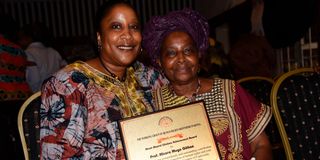Who will sing for Mama Micere Mugo’s orphans?

Prof Micere Mugo (right) with daughter Mumbi Mugo after receiving the Munir Mazrui 2022 Lifetime Award in Nairobi on January 6. She co-wrote The ‘Trial of Dedan Kimathi’ with Ngugi wa Thiong’o.
There are many ways to mourn a mother. Some children cry endlessly. Then there are those who go mute.
When a mother dies, children are orphaned, even when there is a father. Mother’s love, care and presence are irreplaceable.
Prof Micere Mugo was a mother of poets, novelists, liberation struggle fighters, justice seekers, critics, pan-Africanists, academics etc. Her death leaves individual and collective pain.
Eulogising a heroine like Micere Mugo isn’t easy. I had the privilege of interviewing her twice and sitting in the audience at Ukumbi Mdogo, the last one on January 10.
I first read Micere’s works as an undergraduate at Moi University. Her thesis, Visions of Africa: Fiction of Chinua Achebe, Margaret Laurence, Elspeth Huxley and Ngugi wa Thiong’o remains one of the outstanding works of literary criticism by a Kenyan. For the many who will claim to have been inspired by her academic, literary and struggle spirit, the book is a must-read.
Micere Mugo was in the country early this year to receive the Lifetime Achievement Award from the Defenders Coalition and the Working Group on Human Rights Defenders, which she had been awarded in 2022.
She spoke passionately about the struggle for freedom and justice. She reminded those in attendance that Kenyans have to persist in the search for the restoration of Utu/Ubuntu, a theme that defines her life. She thanked Kenyans for the spirit of love, comradeship and genuineness she sensed on the occasion.
Micere had always searched for that which connects humans. This is why her research and writing on the orature of the Agikuyu and her poetry are about daily struggles of ordinary people.
For Micere, orature as a source of knowledge, history and philosophy will continue to live. In order to understand one’s family, friends, neighbours or community, one has to listen, appreciate and seek to understand the stories they tell and how they tell those stories. Orature is the archive from which the living can draw the lessons of the past as well as use to construct the present world.
Africans sang and sing at work; they sing and dance at ceremonies; Africans sing as accompaniment or reinforcement of the message given on different occasions. This is why at the last speech Micere delivered at Ukumbi Mdogo, she insisted that Kenyans need to break negative silence. Kenyans have to refuse to be intimidated not to speak about injustice and oppression.
This is the spirit found in The Trial of Dedan Kimathi, which she co-wrote with Ngugi wa Thiong’o. It is not just the spirit of defiance. It is the ability to consistently fight authoritarianism. When Kenyans discuss the play, they tend to speak as if it is about a subject in some remote past. A careful appreciation of The Trial of Dedan Kimathi would show that colonialism never ended.
It was the colonialists boarding ships and planes back to wherever they came from so they could remote-control their previous dominions. Today, the former colonisers’ minions “colonise” their sisters and brothers.
Micere Mugo has remained consistent in celebrating African knowledge and heritage in her teaching, research, writing and public engagement. She is one of the few Kenyan academics who publicly spoke about the attempt to erase the legacy of the Department of Literature at the University of Nairobi a few years ago.
In her address to a forum organized by Ukombozi Library, Comrades Bookshop and the Department of Literature, Micere reminded the audience that there had been a fierce intellectual struggle to decolonise the department.
Many will eulogise Micere. Others will decry why Kenya continues to ignore its daughters and sons who are celebrated in other parts of the world. More will cite one, two or three of her works.
The the best way to celebrate Micere’s legacy is to remember her spirit of determination and live her call to prioritise our shared humanity. When she spoke at the Lifetime Achievement Award, one saw and sensed the spirit of shared humanity in action. She stood, spoke, sang and swayed to the songs on the occasion.
But the most lasting impression of Micere’s humanity is her humility. When I first met her for an interview in April 2012, I expected someone who didn’t have time for a journalist.
She answered my questions with a smile. She expounded on issues which I thought she had fully addressed. She gave local, regional, African and global examples. Micere insisted that academics have to be grounded in the realities of their communities.
Micere has passed on. But it is what she passed on to us that we should treasure. Mourning her in glorious words won’t do her legacy any good. Kenyans should read her works, listen to her speeches and place her works in the curriculum. Let Kenyan universities memorialise her properly. A library, a centre, tuition block, annual memorial etc, should bear the name of Mama Micere Githae-Mugo.
We cannot afford to forget her the way we have erased the memory of other heroines and heroes who have departed just because they didn’t sing for or in praise of those who have the power to gift and honour others.
Tom Odhiambo teaches literature, performing arts and media at the University of Nairobi. [email protected]





